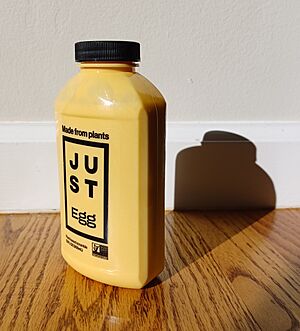Eat Just facts for kids
Eat Just, Inc. is an American food company that creates unique alternatives to everyday foods. It is famous for making plant-based products that are like eggs and for developing cultivated meat, which is real meat grown from animal cells in a lab instead of from farmed animals.
The company was started in 2011 by two friends, Josh Tetrick and Josh Balk. It quickly became very successful. By 2016, it was valued at over $1 billion, making it a "unicorn" company, a special name for very successful startups.
In December 2020, Eat Just made history in Singapore. It became the first company in the world to get approval to sell its cultivated chicken meat to the public. Soon after, a restaurant in Singapore served the lab-grown chicken, which was the first time anyone had ever bought and eaten cultured meat from a restaurant.
Contents
The Story of Eat Just
Getting Started (2011–2014)
Eat Just was founded in 2011, first as Beyond Eggs and later as Hampton Creek Foods. The founders, Josh Balk and Josh Tetrick, started the company in a garage in San Francisco in 2012.
For the first two years, the company focused on science. In their lab, scientists tested thousands of plants to find proteins that acted like chicken eggs. They wanted to find plants that could help ingredients stick together (like eggs do in baking) or mix well. They even created a special database called Orchard to keep track of all the information they learned about each plant.
In 2013, the big grocery store Whole Foods started using the company's first big product, JUST Mayo, in some of its foods. Soon after, other major stores like Costco and Safeway also began selling their products.
Challenges and Growth (2014–2016)
As the company grew, it faced some challenges. In 2014, another large food company, Unilever, filed a lawsuit. Unilever argued that the name "JUST Mayo" was confusing because the product didn't contain eggs, which are usually in mayonnaise. Many people supported Hampton Creek, and Unilever eventually dropped the lawsuit.
Later, the U.S. Food and Drug Administration (FDA) also said the name could be confusing. The company agreed to change its packaging to make it very clear that JUST Mayo was an egg-free product.
During this time, the company also had disagreements with the traditional egg industry. The American Egg Board, which promotes chicken eggs, ran a campaign against Hampton Creek. An investigation later found that the Board had acted improperly, which led to the resignation of its CEO.
In 2016, there were questions about whether the company had bought its own products to make sales look higher. The government looked into it but closed the case, finding no major problems.
Becoming a Global Brand (2016–Present)
By 2016, Eat Just had over 140 employees and was using robots and computers to speed up its search for new plant proteins. That same year, the company's value reached over $1 billion.
In 2017, the company changed its name from Hampton Creek to Eat Just, Inc. to focus on its popular "Just" brand. This led to a legal disagreement with another company that also used the "Just" name. Around this time, there were also some changes in the company's leadership team.
The company continued to grow. In 2019, it bought its first factory in Appleton, Minnesota. When the COVID-19 pandemic began in 2020, more people started cooking at home, and sales of Eat Just products more than doubled.
To expand into Asia, Eat Just partnered with another company to build a factory in Singapore. In 2021, Eat Just raised $200 million to help it grow around the world. In 2022, it partnered with another firm to expand its business in China.
Amazing Food Products
Eat Just is known for creating plant-based foods that can be used instead of chicken eggs. The company's most famous product is JUST Egg, which is made from mung beans and can be cooked just like scrambled eggs.
How Are the Products Made?
To create its egg substitutes, scientists at Eat Just study different plants to find proteins that behave like egg proteins. They look at how these proteins react to heat and pressure to find the perfect ones for their recipes.
The company's first product was designed to replace eggs in baking. Later, it created plant-based mayonnaise and cookie dough. In 2017, it launched JUST Egg, a liquid product that can be scrambled.
The Future of Meat

In 2017, Eat Just announced it was working on something new: cultivated meat. This is real meat, but it's grown from animal cells in a large container called a bioreactor. The cells are given nutrients like sugar, salt, and amino acids to help them grow into meat.
The company's first cultivated meat product was chicken. In December 2020, Singapore became the first country to approve it for sale. The meat is sold under the brand name GOOD Meat.
In 2023, the United States government also gave Eat Just approval to sell its cultivated chicken. This was a huge step for the future of food in America. The company is also working on creating other types of cultivated meat, like high-quality Japanese Wagyu beef.
Images for kids
 | William L. Dawson |
 | W. E. B. Du Bois |
 | Harry Belafonte |





